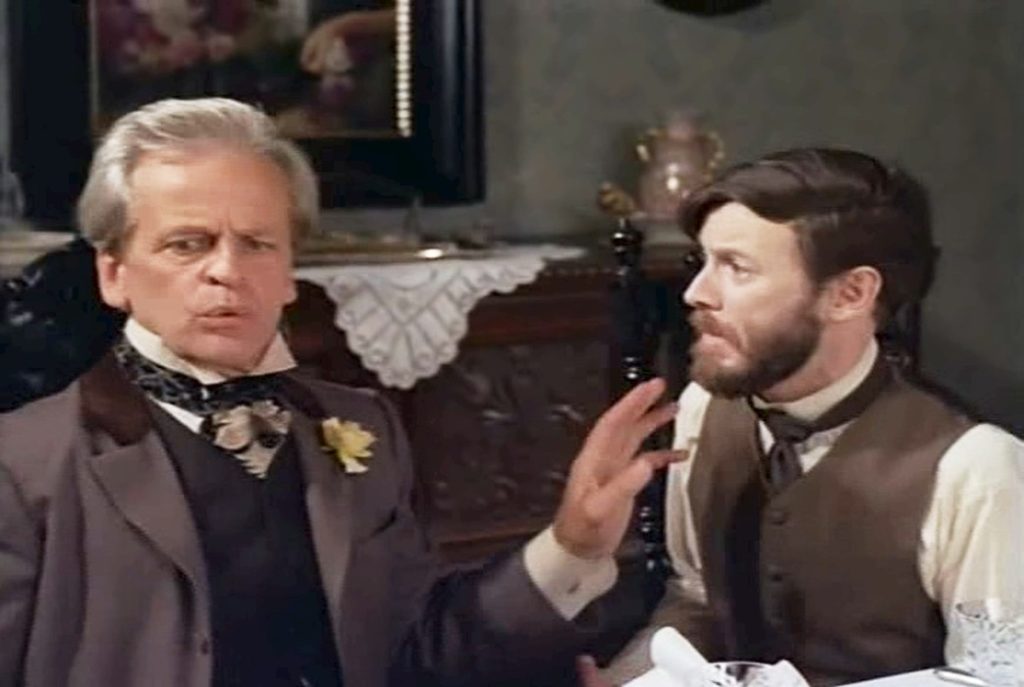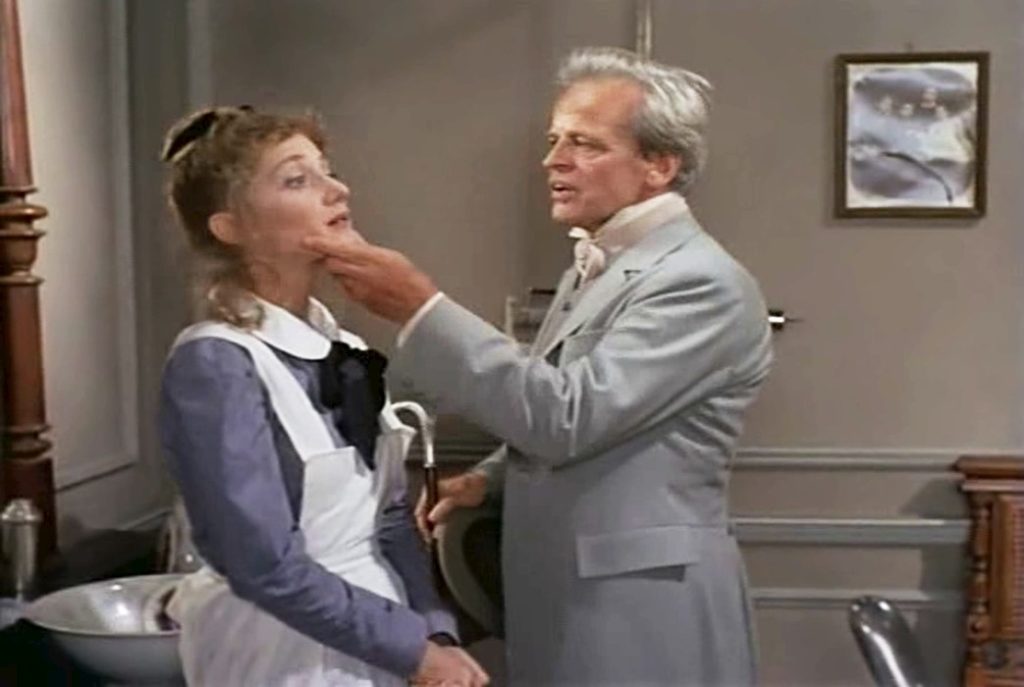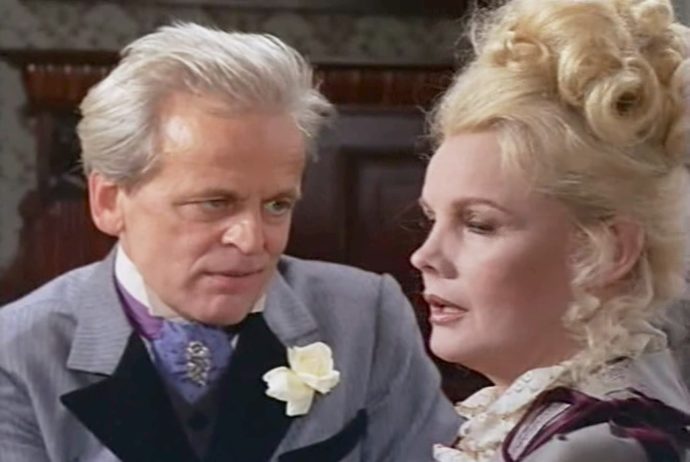Dir: Danford B. Greene
Star: Bud Cort, Carol Kane, Klaus Kinski, Marisa Berenson
Dear lord. Is there anything worse than a comedy which fails, utterly and completely, to be funny? I previously tagged Revenge of the Stolen Stars as being Klaus’s worst movie, when considered overall. But this one definitely deserves to be in the conversation, and given the higher resources here, is likely more terrible, on a per-dollar basis. It’s conclusive evidence that, in the world of movie-making, artistic talent is not necessarily transferable. For director Greene was nominated for an Oscar, not once, but twice. The problem is, this recognition was not for his directing. They were for his work as editor on M*A*S*H in 1971 and Blazing Saddles four year later. Yeah, we are talking about a pair of thoroughly well-respected “comedies” (even if M*A*S*H really is not that funny), but none of his abilities transfer into Danford’s one and only time in the director’s chair.
It would be wrong to blame Greene solely for this disaster, however. The screenplay, by Linda Howard and Roberto Mitrotti, is asinine stuff. If you imagine someone reading the Wikipedia article on Sigmund Freud, and deciding to turn that into a farce, you’ll have some idea of how badly this misfires, on every level. I knew this was going to be a chore, when one of the early scenes has the young Freud being surprised by a horse’s dick. That’s the level at which much of this works: the father of psychoanalysis’s obsession with sex is something Howard and Mitrotti appear to share. Then there’s the casting. Cort may vaguely resemble Freud, in that he has a beard and glasses. But there’s a reason he’s best known for playing creepy in Harold and Maude, rather than comedy. No joke here proves sufficient armor against his ability to suck the life from it.

The story is more or less a retread of Freud’s life from his early childhood, through to his eventual marriage to Martha Bernays (Kane) and discovery of the psychiatric field. This was not so much born out of actual interest, as his discovery at medical school that he couldn’t stand the sight of blood. His phobia ruled out most conventional fields, and drove him to work in treating disorders of the mind, using hypnotism rather than a scalpel [Per Wikipedia, this is entirely made-up] If you’re looking for sufferers of mental illness being treated as the butt of jokes, you are in the right place, because that’s what we get here, headlined in particular by Dick Shawn’s depiction of what the credits call “The Ultimate Patient”. This means him dressing up as anything from Beethoven through the loony archetype of Napoloen, to be treated by Freud. Guess it was cheaper than paying half a dozen actors? I’ll pause here for you to fix your surely splitting sides.
Mel Brooks might have been able to do something with this kind of thing. His collaborator, not so much. In general, I will say that outside of Cort, who seems to be playing the role as an unwanted straight man, the rest of the cast are probably the least ineffective element here. Kane is at least trying, unlike Cort apparently having been informed that this was intended to be a comedy. She vamps things up more than acceptably, and if only there had been more for the script to give her. Carroll Baker shows up and is half-decent as Freud’s mother, while Ferdy Mayne can also be seen. However, there is just nothing for them to do. Even the writers seem to realize this, suddenly injecting a pair of (mercifully brief) musical interludes later on, for want of anything better to do. It makes as much sense as anything else.
Kinski plays Dr. Max Bauer, who appears to have been entirely made-up for the purpose of this film. He’s a friend of the family, and rather obviously (top), is the long-term lover of Mrs. Freud. Though in general he’s very “hands-on,” even making a pass at Martha (below). The concept of Klaus playing a sex-maniac is one which might have had promise. Again, the failure of the script and director to do anything with the idea, helps condemns this to irrelevance, and his character seems to serve no purpose in the narrative. Not that there is much of a narrative to serve. The film ends with Freud inexplicably deciding that there is, in fact, more to life than sex, sex, sex, and apologizing to Martha for having thought so. It’s the kind of unexplained and puritanical twist you’d expect from a film made in the Hays Code era, not one from the mid-eighties.

Shot in Belgrade, I can’t fault the production values, which do a good job of recreating the look and feel of Vienna in the late 19th century. Local cinematographer Djordje Nikolic does his job, which is more than can be said for composer Vojislav Borisavljevic. His soundtrack appears to be operating under the mistaken belief it’s accompanying a Benny Hill episode, though might have been at least somewhat appropriate if there had been any comedy for it to backdrop. Despite a reasonable amount having been spent on this – period pieces aren’t cheap, even in Yugoslavia – it’s entirely understandable why this never appears to have received a theatrical release in any territory I have been able to locate. The movie eventually seeped out directly on home video in February 1987, almost three years after its Cannes Film Market premiere.
Sadly, being one of his later productions, it came too late for Klaus to cover it in his autobiography, I am sure he would have had some pithy comments to offer on the movie, and the pleasures of getting to touch up Carroll Baker, for reasons apparently deemed necessary to the plot. That is considerably more pleasure than the typical viewer will take. I was left without any detectable insight in or knowledge about the subject of this poor excuse for cinema, and had not even been amused by the process. There are films I’ve watched purely for Kinski, which I am pleased to have seen. This is not one of them. The idea of a biographical comedy about Sigmund Freud seemed a poor concept from the start, and the execution very much confirms my skepticism.

Kinski in Italy – w/english subs
https://www.youtube.com/watch?v=T2QVIPwcYGE
In which fellow actors and directors are interviewed about Klaus.